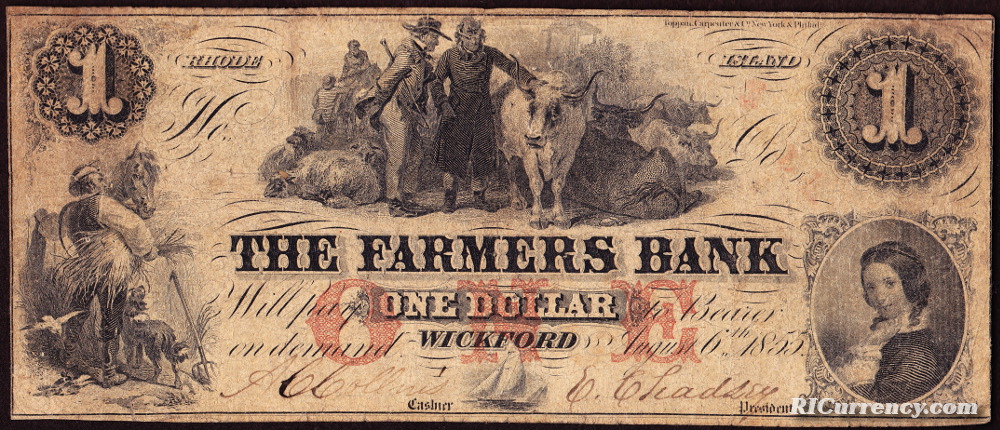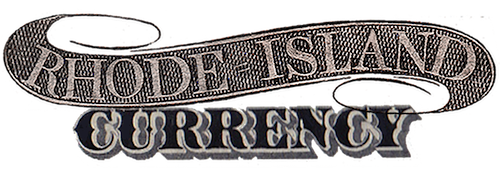Farmers Bank, Wickford
This short-lived institution was originally chartered as the Wickford Bank in 1854, but petitioned the state a year later to have its name changed to the Farmers Bank. It was incorporated with a capital of $30,000.
Euclid Chadsey was its first president and A.C. Collins was named cashier. Chadsey had previously been president of the Narragansett Bank (1833-1836). Records indicate that G.W. Brown became cashier shortly thereafter and then was replaced by Francis M. Jennings in 1857. A signature that appears to be “A.R. Knapp” is visible above the title of president at this point.
According to Roger Durand’s Obsolete Notes and Scrip of Rhode Island and the Providence Plantations, the Farmers Bank fell into the hands of out-of-state speculators who floated large amounts of paper money outside of Rhode Island. As a consequence, the bank failed in 1857. Whether or not the men behind this were Jennings and “Knapp” is not clear.
Since “The Farmers Bank” was a somewhat common name among small town financial institutions of the day, the failure of the Wickford enterprise led to its worthless banknotes being manipulated by counterfeiters. There are numerous warnings in period newspapers about these notes being altered to look as if they’re from the Farmers Banks in places such as Bridgeport, Connecticut, Lansingburgh, New York and Orwell, Vermont. One colorful story tells of two employees of the Harlem Railroad Company in New York City catching a counterfeiter. From the cupola of their depot, the workers could see a man in his apartment busy at work manipulating bills that turned out to be from the Farmers Bank of Wickford. A sergeant using a “powerful opera glass” was able to confirm their suspicions and the suspect was arrested.
Another curious arrest that relates to the bank took place on April 12, 1857. It began the day before when Charles L. Brown, a merchant, was traveling from his hometown of Boston to New York City. Along the way, he ran into Euclid Chadsey, the president of the Farmers Bank. The two knew each other as Brown was a stockholder of the Wickford enterprise.
Chadsey seems to have followed Brown, first on the train and then on a steamship from Stonington, Connecticut. In New York City- at the corner of Canal and Broadway to be exact- he approached a policeman and asked that the merchant from Boston be arrested. Chadsey believed that the man had defrauded his bank. In late 1856, Brown had presented cashier A.C. Collins two checks from the Blackstone Bank of Boston for which he received a total of $5,000 in Farmers Bank bills. The checks turned out to be worthless.
Under suspicion of this crime, Brown was taken to the Tombs (a jail in lower Manhattan) but was released later in the day when formal charges never materialized. Brown, in turn, sued Euclid Chadsey for false imprisonment and won a $2,000 judgement against him. When Chadsey appealed, he lost again and this time was asked to pay the plaintiff $7,500! Eventually the case made it all the way to the New York State Supreme Court and, on March 13, 1863, the verdict was set aside on the grounds of excessive damages.
In the end, it’s doubtful that anyone was ever held fully accountable for the failure of the Farmers Bank.





